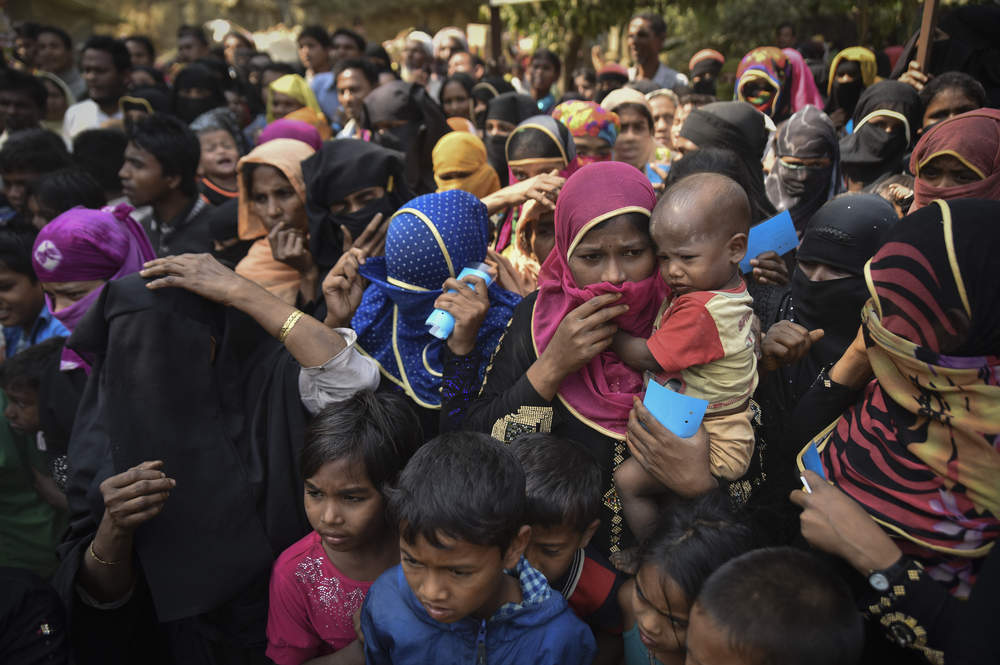
Myanmar’s de facto leader Aung San Suu Kyi, who was awarded the Nobel Peace Prize in 1991, has failed to criticise the country’s brutal military.
As part of a bloody army crackdown, more than 400,000 Rohingya Muslims have fled to neighboring Bangladesh in what has been called a “textbook example of ethnic cleansing” by the United Nations (UN).
The government of Myanmar, a majority-Buddhist country, does not recognise the Rohingya as citizens.
Bangladeshi officials said that land mines had been planted on Myanmar’s side of the border in an attempt to stop the Rohingya from escaping the carnage.
At least 210 Rohingya villages have been burned to the ground since the offensive began on August 25, according to Human Rights Watch.
Figures published by the European Rohingya Council (ERC) revealed that 3,000 Rohingyas were killed in the first three days of violence alone.
Suu Kyi’s unwillingness to condemn the atrocities has led some to call for her Nobel Peace Prize to be revoked.
A change.org petition entitled “Take back Aung San Suu Kyi’s Nobel Peace Prize” has already garnered over 426,000 signatures.
What has Suu Kyi said publicly about the crisis in Myanmar?
In her first public address since the army campaign of killing, rape and village burning began, Suu Kyi said:
The security forces have been instructed to adhere strictly to the code of conduct in carrying out security operations, to exercise all due restraint and to take full measures to avoid collateral damage and the harming of innocent civilians.
Rather than denouncing the military, she spoke of the importance of waiting for “solid evidence” before making “allegations” of misconduct.
We too are concerned. We want to find out what the real problems are. There have been allegations and counter-allegations. We have to listen to all of them. We have to make sure those allegations are based on solid evidence before we take action. I’m aware of the fact that the world’s attention is focused on the situation in Rakhine state. As a responsible member of the community of nations Myanmar does not fear international scrutiny.
How has the international community reacted to Suu Kyi’s comments?
Amnesty International said Suu Kyi’s speech showed that the leader and her government were “burying their heads in the sand over the horrors unfolding in Rakhine state”.
James Gomez, Amnesty International’s regional director for south-east Asia questioned why Suu Kyi did not address why the government had been so reluctant to let UN investigators into the country.
If Myanmar has nothing to hide, it should allow UN investigators into the country, including Rakhine state. The government must also urgently allow humanitarian actors full and unfettered access to all areas and people in need in the region.
Azeem Ibrahim, a senior fellow at the Center for Global Policy and author of The Rohingyas: Inside Myanmar’s Hidden Genocide, said Suu Kyi is more interested in cementing her political power than establishing peace.
She’s no longer a peace campaigner, she’s evolved and transitioned into a full-time politician.
Penny Green, a professor of law at Queen Mary University of London who studies the Rohingya conflict, called Suu Kyi’s speech “disingenuous”.
On Monday, Boris Johnson, Britain’s foreign secretary, led a private discussion about the Rohingya crisis with foreign ministers at the UN General Assembly. He said in a statement:
I was encouraged by our discussion and by the participation of the senior Burmese representatives. But we now need to see action to stop the violence and open up immediate humanitarian access.
Suu Kyi’s failure to denounce Myanmar’s military was welcomed, however, by Russia’s ambassador who said that there was no evidence of ethnic cleansing in the country.
China also praised Suu Kyi, saying her speech would improve the global understanding of the crisis, Reuters reported.
China’s ambassador, Hong Liang, said:
The stance of China regarding the terrorist attacks in Rakhine is clear, it is just an internal affair. The counterattacks of Myanmar security forces against extremist terrorists and the government’s undertakings to provide assistance to the people are strongly welcomed.
When the UN Security Council condemned the violence in Myanmar last week, China blocked Egypt’s proposal to add language calling for Rohingya refugees to be guaranteed the right to return to Myanmar from Bangladesh, Agence France-Presse reported.
The 72-year-old Nobel laureate decided not to attend the UN General Assembly in New York this week, where world leaders are discussing the ongoing violence in Myanmar as well as other key global issues.







